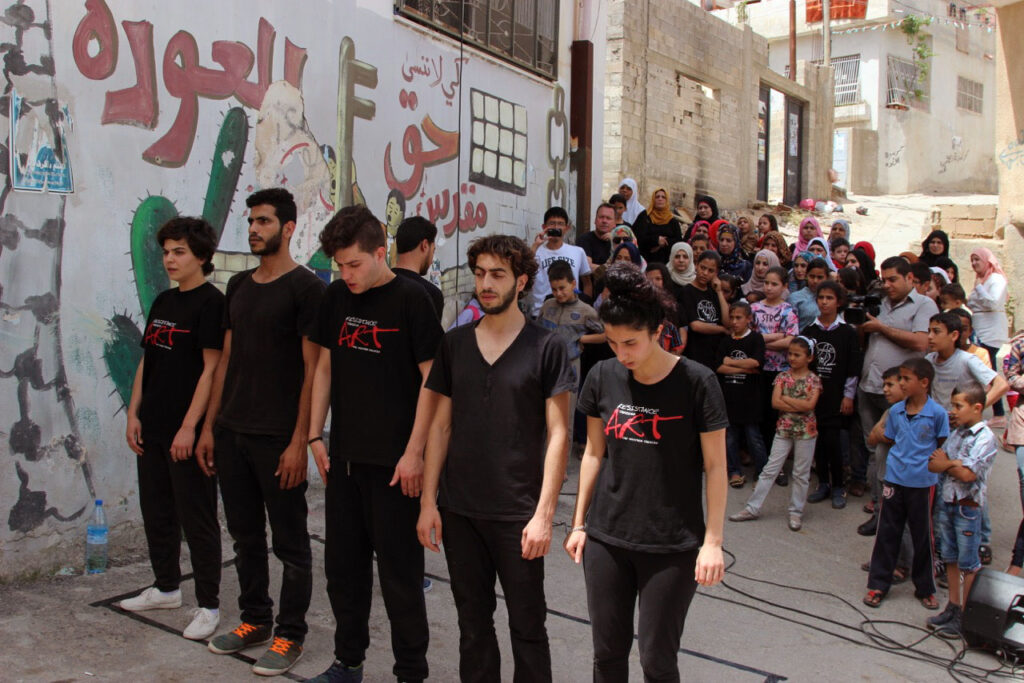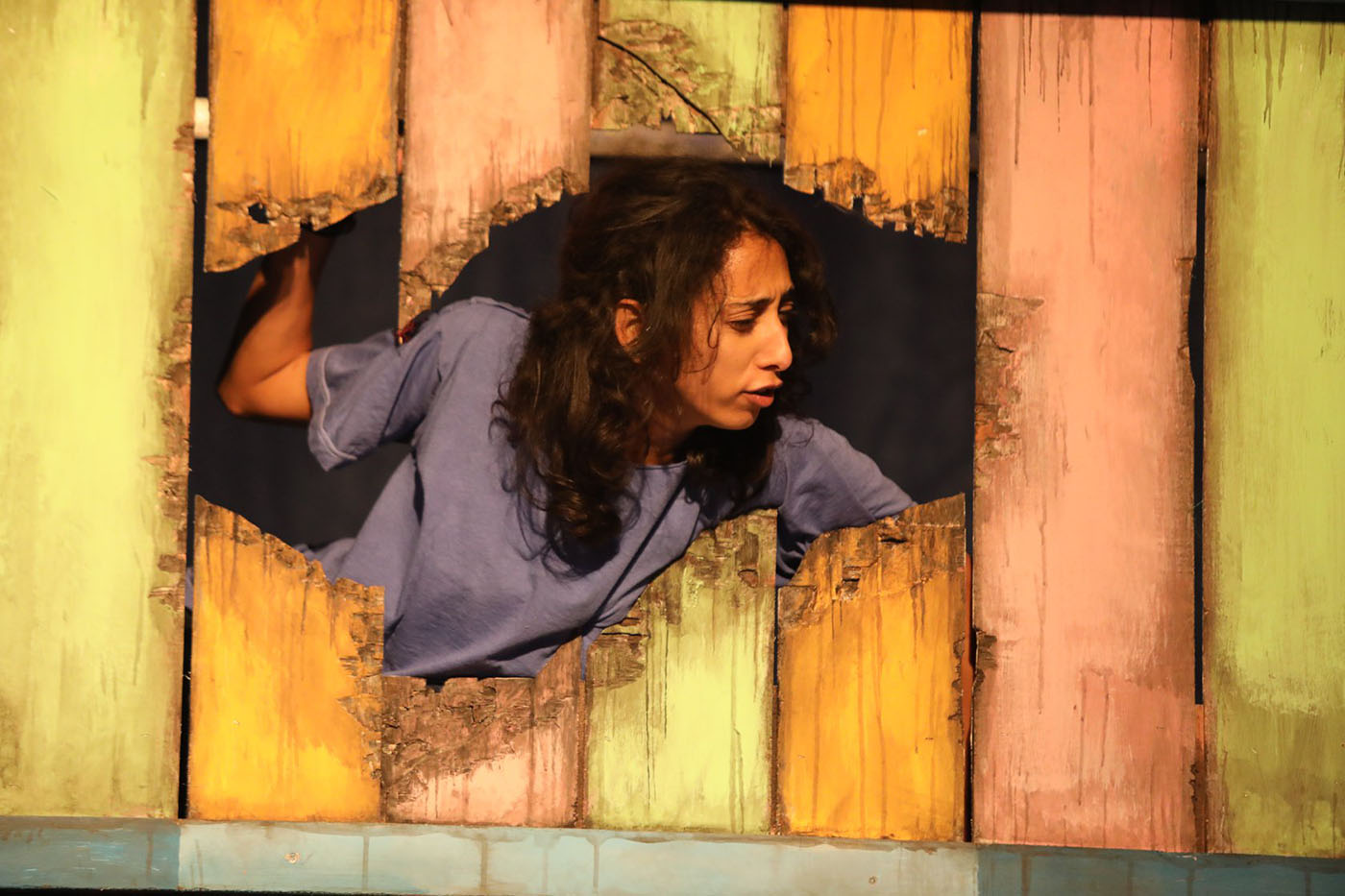Putting on a play in a Palestinian refugee camp is plagued by tensions from inside and outside the community.
Asim Rizki
They were speaking in a language that Amal did not understand but she guessed that it was French. The boys both wore ripped jeans, and the girl had on a knee-length, fading red skirt above sturdy black boots. All three of them had unkempt hair down to their shoulders. It was a common look for the international volunteers who came to the refugee camp.
A play was to be performed that evening. Amal’s friends were talking about it, one of them describing her own role. “You will not know it is me because I will have a white wig to make me into an old woman. I only have to speak two sentences. Not like Amal, she is the star.”
They turned to her, expectant smiles on their faces. In the crowd outside the theatre were also her parents and university teachers.
A year ago, the group of friends had started drama classes together. Most of them dropped out after a couple of sessions, but Amal and Yara persevered and were given parts in a production. Amal had been so excited that she told everyone she knew about it. Now she was thinking that it might have been a better idea to have kept it a secret.
“You’re very quiet. Are you nervous?”
She forced a smile at the boy who had asked the question. “No. Well, just a little.”
Another one said, “Don’t worry. You’ll be great.”
Yara looked round. “Oh, here is Manuel.”
Everyone turned to see a well-built man with a trimmed grey beard walk from a side building and into the auditorium. Manuel was the drama teacher and founder of the theatre. Amal could imagine the different things that people were thinking: Some were remembering what he said in class; others were excited to see a celebrity, as he had been a famous actor; and a few reflected on his origins and saw one of the enemy.
People from the other side would often come to work there. Apart from Manuel, there was the manager of the theatre and frequent visitors who were supposedly against the Occupation. Some of her friends didn’t like meeting them but they just seemed like normal people to her; she couldn’t really think of them as their oppressors.
As the guests were being ushered in, she spotted her parents and waved at them. There was a chorus of “good luck” from their friends, and Yara and Amal were left with the four other actors. The noise of the audience built up inside.
Manuel came out and clapped his hands once. They went in and stood in the darkness by the side of the sloping rows. A concert was to take place before the play. A band came on and played some jazzy tunes which were received politely by the audience. Then an older portly man joined them on stage. He nodded at the crowd’s enthusiastic applause and took the microphone.
Amal knew him to be a local singer. She looked round at the people. As he started singing, a spark came into their eyes and their faces seemed to have renewed color; they watched and listened with lips parted into a smile, some of them mouthing the words to the song silently. They cheered as it ended. Then the children in the front rows jumped up as the next one began and sang along and clapped in time.
An inspired energy coursed through Amal. Her purpose had become clear. These people would be lifted by her just as they were now. They would be enchanted by her performance, so that all their struggles and disappointments could be forgotten. She would take them above anything that life could throw at them.
Amal and Yara clapped and swayed to the music. They looked at each other and laughed. Their time was coming soon, and they were looking forward to it.
As the band played, Amal noticed someone standing by the side of the stage. He furtively approached the guitarist. It was the manager of the theatre. He spoke to the musician as another person appeared in the shadows behind them. It was a little man with something in his hand. Suddenly he raised his arm. In one moment, a flash of light illuminated the place, the music stopped and everything went dark.
For a second there was silence. Then a child screamed and boys shouted. Mobile phones were used for light, as people got up and calmly made their way to the exit. The actors were by the door so they were among the first out. They stood quietly and looked at the ground.
Their friends joined them and started speculating as to what had happened:
“That man had a hammer.”
“No, it was an axe.”
“What was his problem?”
“He must live near here. Maybe he was sleeping and the music woke him up.”
“Or he didn’t like that boys and girls were together in the same place.”
Amal was trying to calm her thoughts. All that work and preparation had been for nothing. She told herself that it didn’t matter and it was time to go home and prepare for her classes tomorrow.
She turned to Yara. “I’m going.”
Yara kissed her on the cheek. “See you tomorrow.” The others were deep in conversation. Amal turned away, found her parents and suggested to them that they leave.
They walked onto the narrow street in front of the theatre and past the near derelict buildings squeezed next to each other. Her mother said, “I looked for Yara’s mother, but I don’t think she came.”
“No, she wasn’t feeling well.”
“And Yara, is she ok?”
Amal didn’t answer. Maybe she should have stayed with her friend. It was difficult to know how to support her. She was going through something that Amal could only imagine.
It had been more than two years since Yara’s brother had been taken. She remembered that Kamel used to joke with her when she was at their house, saying that she was the most fashionable person in the town. But the memory of his face was becoming vague.

That summer, the Occupation forces could be heard rumbling around in their jeeps and trucks at all hours. They would come late at night into the towns and villages, on patrol or searching a target with a location. If they were looking for someone, he rarely came easily. There was usually an argument or a long search, and maybe even a battle before they took their prisoner.
There had been screaming and shouting when Yara’s brother was arrested. The family had neither the will nor the means to fight. So, he went with the soldiers and no one knew when he was to come back. The official line was that he was under administrative detention for six months. Several trials took place which were inconclusive and each time the term was extended for the same period.
Others returned from the enemy’s prisons. They were gaunt and unresponsive, at first. It took time for them to adjust back into life with their families and friends. They told of the conditions under which they had lived: Twenty of them would be sleeping on mats in a giant tent; they ate gritty porridge or rice and lentils; they did their toilet in a trench; most days there was nothing to do but play cards and smoke.
Prisoners could be freed at any time. Yara and her family lived with this, and as Amal saw her friend most days it was her problem also. It was a constant challenge to know how Yara was feeling, let alone keep her spirits up. She was normally talkative. Then there would be days when she said little, her face pale contorted into a grimace.
“Is there any news about Kamel?”
“No. My mother was crying all last night.”
“You must be strong for her. I am sure he will be back soon.”
Amal had only sisters, so her family would likely be spared a similar ordeal. It didn’t make much difference because it felt like the land was one big prison. There could be no other place like this. People couldn’t agree on where it began and ended. Some of the enemy even claimed it didn’t exist.
Amal and her parents came to a taxi rank. It was a short drive to their house. She looked out of the window. Derelict cars had been left to rot on a section of wasteland. Shops were boarded up, apart from a couple of grocery stores which were still lit. Piles of rubbish lined the dusty streets. She couldn’t be certain of her feelings as they passed through the town. She knew for sure, though, that this would always be home.




